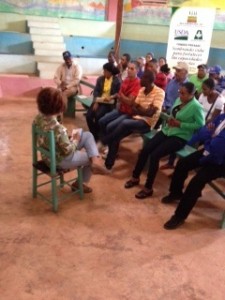 27 January, 2014
27 January, 2014
Elias Piña, Dominican Republic, January 27, 2014. – Under its Food Security Program, the Batey Relief Alliance (BRA) partnered with Dominican Republic’s Ministry of Agriculture to launch a new agricultural initiative that strengthens production capacity for local farmers living in rural border regions. Funded by the US Department of Agriculture (USDA), the one-year initiative seeks to improve local farming, agricultural practices and marketing processes—thus creating a firm base for economic growth for farming families living in the Rio Limpio community, province of Elias Piña.
Rio Limpio is a small border community with limited infrastructures and access to electricity or running water. The lack of decent roads greatly hinders local farmers from rapidly transporting their products, and thus narrows their market considerably. Additionally, they lack the resources and materials to prepare the land and harvest crops, and use inadequate farming techniques to adversely affect the environment, namely the Dominican National Park, Nalga de Maco.
“Through this initiative, called “Sowing Seeds of Life”, BRA aims to revive agricultural production and strengthen market opportunities in Rio Limpio, by organizing 50 farmers to form a Farmers Association to successfully run and manage the project,” said, Maria Virtudes Berroa, BRA’s Executive Director. Through education, training and workshops, farmers will also learn about agricultural production best practices and environmentally friendly conservation techniques. “Furthermore, we will orient them in strengthening ties with the local government, non-governmental actors and the religious community; on efficient use of land; and in identifying market niches to sell their products—ensuring increased access to resources and project’s long-term sustainability,” added Ms. Berroa.
Meanwhile, BRA has formed strategic public-private alliances with a number of local actors, including the Rio Limpio Mayor’s office, the Dominican Ministry of Environment [and nature conservation], Infotep, the Dominican Agrarian Institute (IAD), the Special Fund for Agricultural Development (FEDA), as well as other local organizations working in Elias Piña. “Through these collaborative relationships, BRA will help improve product marketing and increase revenue generation to revive the local economy, and allow for long-term, sustainable production and sales for the community,” concluded Ms. Berroa.
From 2009-2011, BRA created a USDA-funded cooperative agricultural production within seven rural batey communities in the province of Monte Plata where farmers are now producing crops and animals to feed their families and create economic independence for their communities.